Election A to Z — B is for Basic Income
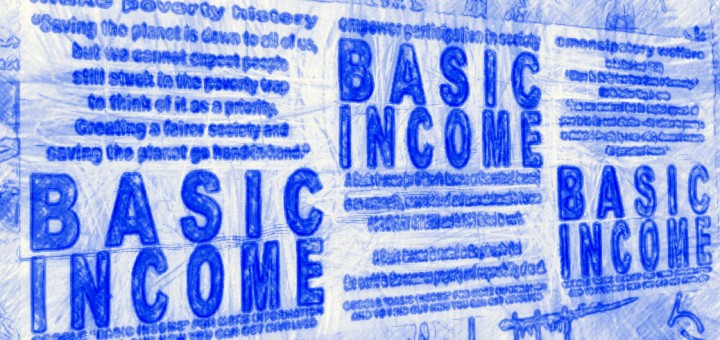
The Green Party is probably the most radical of those on offer at this general election. Many of its policies are pretty “out there” (ie. seem bonkers to most people). One that might appear so at first sight, but we believe is worthy of closer examination, is the provision of a basic income to all adults without means testing.
This is actually an idea that has been around for hundreds of years, and has been advocated by quite a wide variety of people across the political spectrum:
- Famous economists, many of them Nobel prize-winning, like Paul Krugman, Milton Friedman, F. A. Hayek and J. K. Galbraith
- Philosophers like Bertrand Russell, John Stuart Mill and Thomas Paine
-
Politicians like Martin Luther King and Desmond Tutu
So let’s take a closer look.
Contents
What is Basic Income?
Let’s start by taking a look at a classic basic income policy, before moving on to the situation in the UK, and what the Greens are proposing.
The traditional definition of a basic income (BI) is “an income unconditionally granted to all”, that is without:
- a requirement to work
- means testing of wealth or income
There is some debate as to whether children should receive BI, and whether retirees should receive the full rate, but a moderate position might be that all adults receive BI, with a lower rate provided for at least the first two children.
What’s so good about a basic income?
We won’t focus here on moral arguments, but rather social and economic ones. Introducing a Basic Income would:
- Eliminate the “unemployment trap”, where the unemployed are put off working by the loss of benefits.
- Of course, if BI is too high, there is no incentive to work whatsoever.
- Similarly, if existing benefits were low enough, jobs would seem attractive anyway.
- Eliminate poverty – but existing welfare systems can / could also achieve this, so the real debate is whether BI can do this more cheaply.
- Reduce bureaucracy – if everyone is entitled to BI, no one needs to check entitlement, or which benefits a particular household receives. We all get the same.
- Reduce fraud – the only way to defraud the system is to create imaginary people (or keep dead ones apparently alive). This would also increase confidence in – and support for – the welfare system.
- Reduce labour market regulation. The minimum wage becomes unnecessary, since BI already supplies the minimum income.
- Remove the welfare demographics time-bomb: all ages are already entitled to BI.
- An alternative way of looking at this is that it brings forward the problem of demographic time bomb to today. No doubt BI would need to be carefully phased in.
- Deal with the looming problem of mass unemployment through automation and robotics, and the consequent pressures on the welfare system.
- Again, in practice, BI deals with this issue by bringing it forward to today, and some phasing would be necessary.
Possible side effects of basic income
There are some issues around BI that are not clear wins:
[space]
- It’s unclear what the effects of BI would be on low-paid (low-skill) jobs.
- In theory, BI increases the bargaining power of workers. It’s interesting to speculate whether collective bargaining and indeed unions might not disappear.
- Minimum wage jobs would disappear, but how much firms would need to pay to tempt people into the workforce is unclear
- If unskilled workers don’t want these jobs, how will the work get done? Automation has a part to play, but might this not encourage further immigration? (( BI would have to be restricted to nationals to avoid “BI tourism”)) Can low-skill work be entirely automated?
- Could increase entrepreneurship since it would be less risky to try something new with the BI safety net.
- Could also reduce entrepreneurship since there is less necessity to earn your own money.
- Could similarly increase charitable and academic work (including open-source), and the arts.
- May reduce the pay of highly skilled workers as more people are able to take the time necessary to gain those skills.
- Legal, financial, and health care services might become cheaper
- Since most models of BI assume a single income nationallyrather than regional variations, it’s possible that BI would result in internal migration. ((A single level of BI is much simpler and cheaper to administer))
- The cost of living in cities is generally higher and in the case of the UK, costs in London are much higher than elsewhere.
- It’s possible that those not intending to work would move to poorer areas where their BI would go further.
- On the other hand, existing welfare is not regionally adjusted, so presumably much of this sorting has already happened.
How much would the basic income be?
There’s no set figure for how much money BI should actually be, but we can start by looking at the new state pension which is £8K. That still qualifies the recipient for pension credit and housing benefit, so it’s clearly not enough to live on.
The minimum wage of around £12K is probably a better place to start. We might think that a £4K BI for the first two children under 18 would be a good idea also. ((We don’t want to encourage large families just for the sake of collecting more BI, so further children would receive nothing))
Next we need to set a cap for a household. The current UK cap on benefits is £26K (around the same as the average wage), but this is due to fall to £23K. Two adults on £12K BI would receive £24K between them so that’s our starting point for the cap. Add in two children at £4K and we have an income of £30K, which is too much.
We don’t want to encourage families to live apart to collect more money so it’s probably better to reduce the child BI to £1K and keep the existing £26K limit per household.
Wouldn’t basic income cause inflation?
This seems to be a common criticism of BI, though it’s not obvious to me why that should be. It’s just a (hopefully) small redistribution of money from rich to poor, with no increase in the money supply.
It’s true that the poor spend more of their money than the rich, so there will be an increase in the velocity of money circulation and the multiplier effect, plus an increase in demand for certain goods. Any inflation from this should be temporary at the time of implementation.
It’s possible that BI could cause wage inflation, but automation and immigration may reduce this impact.
How do we pay for it all?
This is where it gets tricky. It’s hard to cost a BI policy against the existing welfare and government bureaucracy it replaces, and this hasn’t been done properly for a large, developed democracy like the UK. It’s possible that additional taxes will need to be raised. Ideas popular amongst BI fans include:
- a tax on high-end consumption (such as a luxury rate of VAT)
- a Tobin (Robin Hood) tax on financial transactions
I’m not a fan of transaction taxes in any form, as they remove liquidity from markets. A luxury VAT rate would get my vote, though coming up with a common definition of luxury might be tricky.
Basic income is often seen as a left-wing policy, but we don’t have to look at it that way. BI preserves most of the existing incentives for hard work, saving money and entrepreneurship, since everyone gets BI, and those who also work hard will still have more money. ((There’s a slight loss of incentive if extra taxes need to be raised to pay for BI))
It’s also a true “small government” policy in that it cuts bureaucracy and stops the government from interfering in people’s lives. The poor no longer have to jump through official hoops to qualify for their benefits.
What are the Greens proposing?
Actually, not a lot. After the policy grabbed the headlines back in January, it’s been toned down in the manifesto to become a long-term aspiration, rather than a first-term pledge:
- there would be three levels of BI: child, adult, pensioner
- other benefits would be scrapped, apart from disability and housing benefits
- the income tax personal allowance would be scrapped
The Greens seem to be in favour of everyone paying tax so that they have a stake in society, but this is flim-flam. If the tax comes from a BI handout from government, you’re just giving with one hand and taking with the other. You might as well keep the personal allowance and reduce BI from £12k to £9.6K – it’s the same effect. ((There’s also the fact that scrapping the personal allowance would drag millions of people earning over £30K into the higher rate tax bracket – close to half of workers would be in there, which is far from what was originally intended))
The manifesto no longer includes a figure for BI, but when it was originally proposed, the figure of £3.8K was used – this is the same as the basic job seekers allowance, which is not enough to live on without other benefits. As housing benefit is the only other benefit retained on the Greens’ plan, this figure is clearly not generous.
Ironically, the Greens’ proposal was criticised on the left because many of the people who lose out on the scheme are the poor – those who currently receive much more in benefits than BI would provide.
Conclusions
- Basic Income is not a utopian left-wing fantasy but simply an alternative way of providing welfare
- It is a fairer, simpler and more small-government system than what we have today
- What the Greens are proposing is only a half-hearted version of BI
- At present, BI would likely be more expensive than the current system and so is unlikely to be adopted
- The looming impacts of demographic change (ageing population) and automation / robotics (large-scale job losses) will probably mean that something like BI will be needed eventually
At this point it may well be a cheaper solution than the current system (in relative terms only – by then the welfare budget will likely be a much larger proportion of GDP).
To see more of our election coverage, please go to our Election A to Z page.
Until next time.














Hi Mike
You have made some very useful observations here and though I am on the left of politics I am pleased to see a person who, I presume from your comments aligns himself to the right, taking on the idea of a basic income in a thoughtful manner. You refer to the Green Party BI proposing a certain amount and I guess you are talking about the £72.40 figure which was taken erroneously by journalists in January from the Citizens Income Trust proposals on their website. It was not the figure we had in mind, and this caused much confusion at the time. We have published an additional document about BI which is not part of our 2015 manifesto, but it shows we are very serious about this policy. We equally know BI will entail fundamental reform of the benefits and tax system, so having it as a longer term policy is sensible. What I am most pleased about is that discussion of BI has come out from academic circles into the political arena.